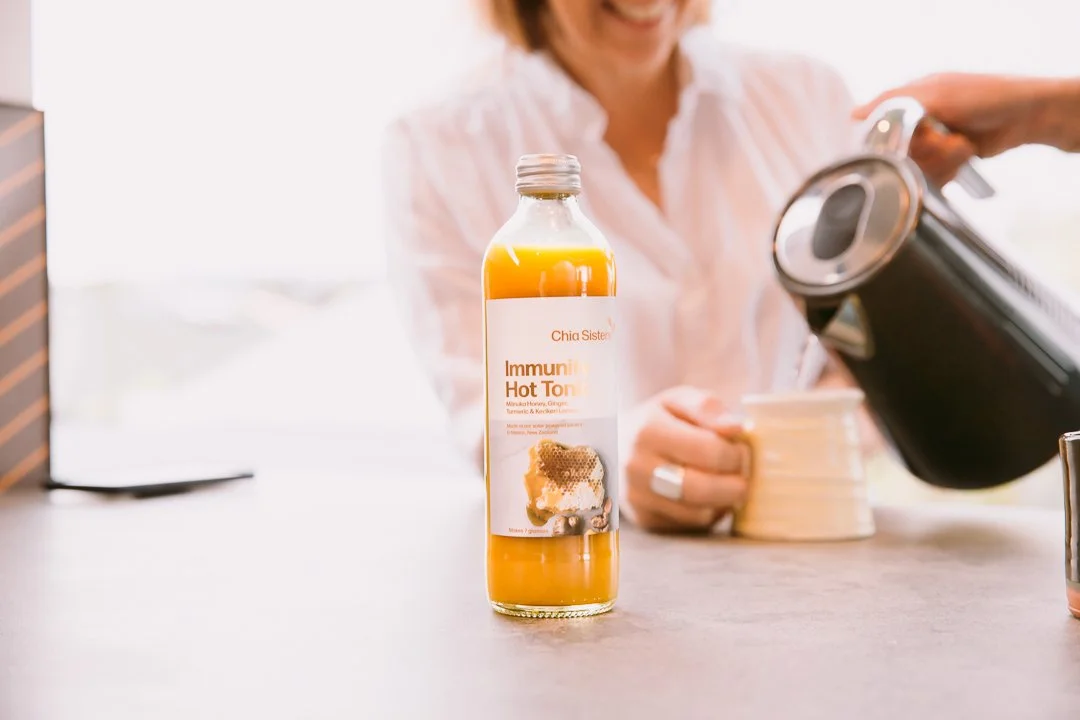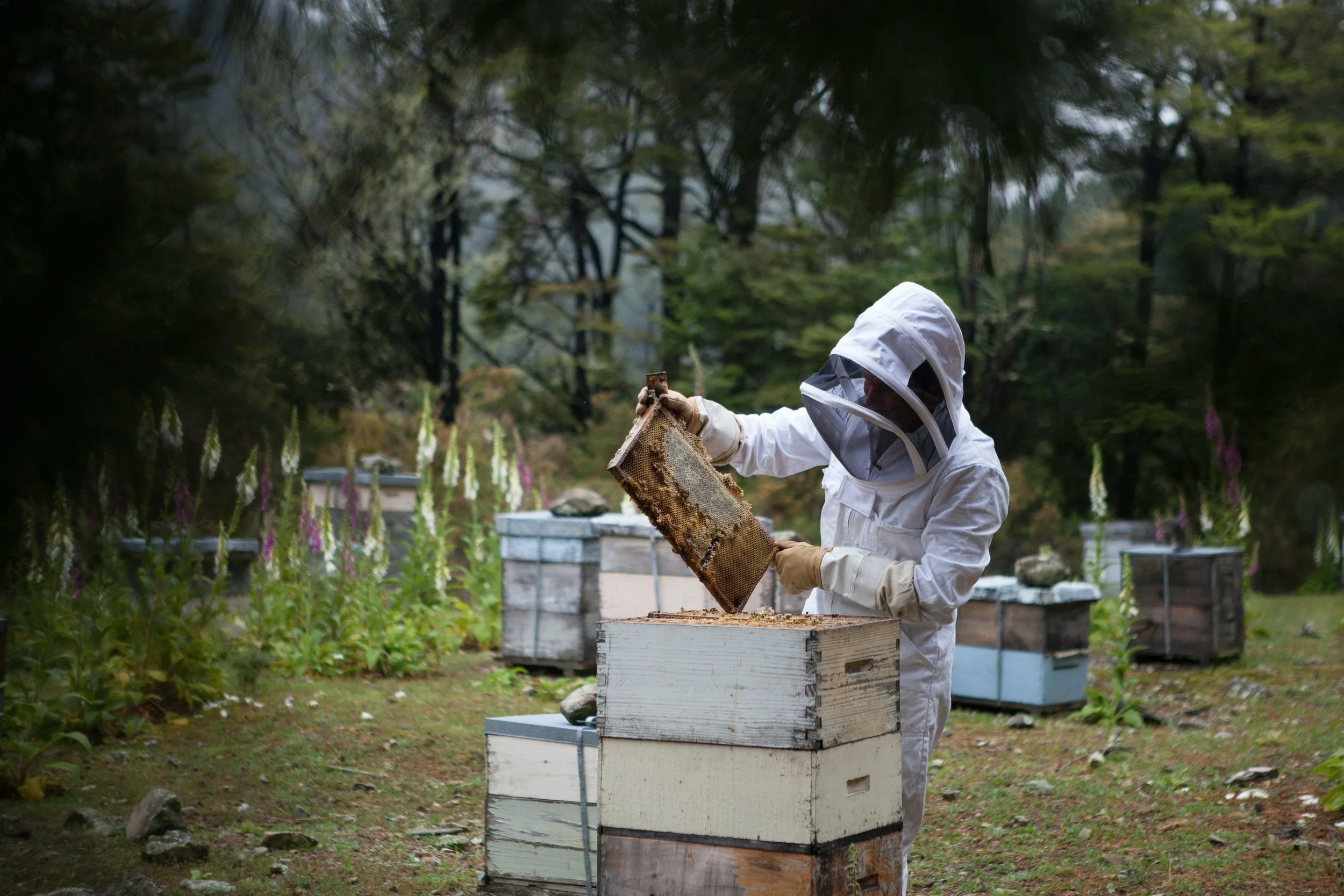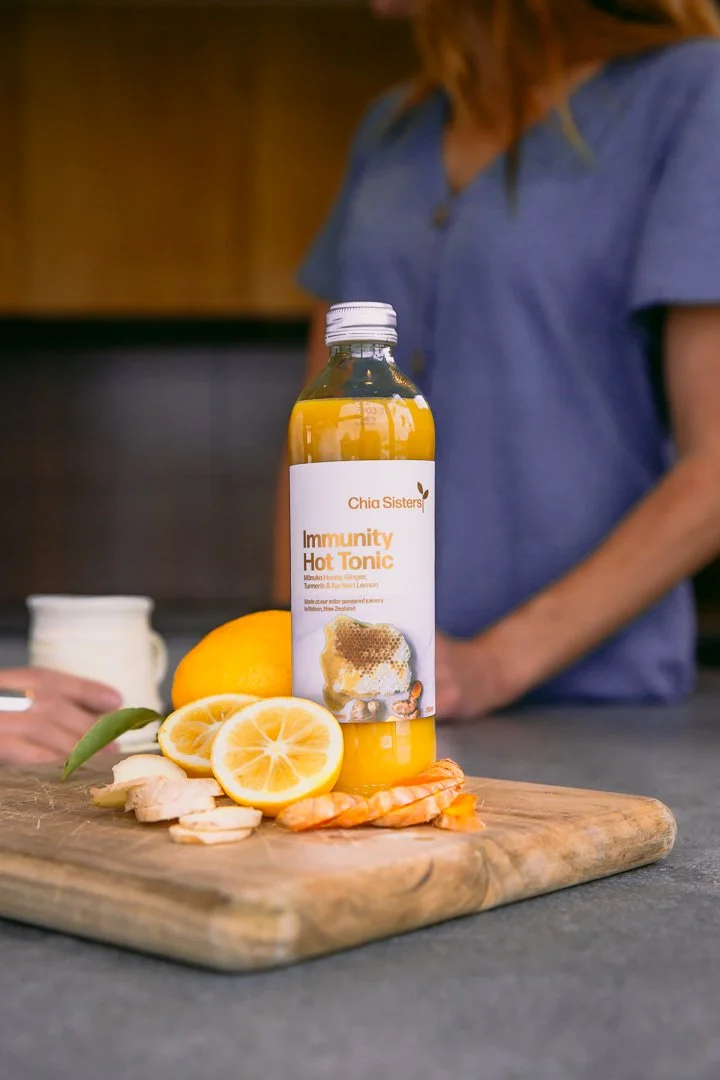Beverage Category: 2021 Winner Chia Sisters - Immunity Hot Tonic
Chia Sisters was awarded the Beverage category award in 2021 for their Immunity Hot Tonic.
Like many New Zealand owned and operated family businesses, Chia Sisters had to quickly transform their business model after the first Covid lockdown in 2020 to ensure their survival. At the time, they were positioned in the hospitality market as a well-known beverage in the café scene, which represented 70 per cent of the business's domestic turnover.
Chia Sisters' dedicated team quickly pivoted to produce a new product – Immunity Hot Tonic. The new beverage enabled them to differentiate themselves from the market by creating a unique beverage that aided customers with a natural immunity boost right when it was most needed. The new product paved the way for new customers, new revenue streams and online sales, all of which contributed to the survival of the business.
"The New Zealand Food Awards validated that Chia Sisters Immunity Tonic is what we innovated it to be - a world class product and leader in functional health. Since we stamped the New Zealand Food Awards Quality Mark on our bottle we have taken it into the US market where it is gaining traction at some of the most premium health food stores in the world."
Entry (extracts):
1. Product Name
Chia Sisters Immunity Hot Tonic
2. Product Description
Chia Sisters Immunity Hot Tonic is a tonic concentrate made with Golden Bay Mānuka honey, ginger, turmeric, lemon and Hawke's Bay apples. 50ml of Hot Tonic is to be served with 150ml of hot water for a winter warmer.
Innovation
3. Where did the idea for this product come from?
In March 2020 when lockdown was announced, our cafe sales that usually make up 70% of our domestic turnover dropped to $0. Sales continued to drop as supermarkets stopped ordering. Consumers were looking to top up on pantry essentials.
As a food producer we were able to stay open, however, our only form of revenue was online sales which had previously been around 5% total revenue. We know our team is our most important asset and we were eager to keep all employees on full pay so our goal was to lift revenue via online sales. We held innovation sessions over Zoom and discussed what products we could launch onto our online platform. We had access to premium local ingredients, our Chia Sisters innovation food tech hub, delivery to consumers’ homes across New Zealand and of course our solar powered juicery. Plus a team that were eager for work. At that time we knew that Bio Honey, New Zealand's premium Mānuka honey from just over the hill in Golden Bay was still collecting honey through their bee guardian process. However, because of global freighting issues they had an oversupply. The idea to partner with Bio Honey to create a Hot Tonic that utilises the health benefits of honey was born. We spent the next four months tweaking the formulation and flavour profile in our innovation food tech hub.
4. How did you determine the product originality?
This is a unique blend because it mixes a natural New Zealand health product (Mānuka honey) with traditional immunity boosting agents from the zingiberacae family (ginger and turmeric). Ginger and turmeric have been used for medicinal purposes in South East Asia since 500BC.
We have been unable to find a beverage in New Zealand supermarkets that utilises the health benefits of Mānuka honey with other natural immunity boosters like lemon, ginger, and turmeric. We have been operating in the functional health beverages sector for 9 years.
5. Did you consider any new technology to your company in the development of this product?
Through the development of the Immunity Hot Tonic our goal was to bring the old technology surrounding traditional bee keeping and bee guardianship to life.
The bee guardians that collect the Mānuka honey are often second or third generation beekeepers who hold old knowledge and prioritise bees over profit. They are registered as Master Beekeepers which acknowledges their specialised skill and craft. This craft is part of an interdependence between humans and bees. In modern times human and bees rely on each other for survival. This is a complex issue but the basics are that we need bees for pollination and, for the time being, bees need humans in order to survive against pests like Varroa. In an ideal world, commerce would not need to be a part of this but for the foreseeable future it is vital that we pay and empower those who raise and care for bees.
While this is not 'new' technology we are proud to be supporting old technology, crafts and skills that are more critical today than they have ever been.
6. What were some of the challenges in developing your product and how did you overcome them?
Firstly, it was developed during lockdown. Our production room is small and takes at least three people to run. Chia Sisters was legally able to run the production line because we were deemed an essential service. However, we wanted to ensure that our team were able to stay in their chosen bubbles. Our Production Manager, Kevin Toughey, put his hand up to have his wife and daughter on the production line to ensure no bubbles were broken. This offer is a reflection of our close-knit team culture. Our team and their whānau go above and beyond, particularly during difficult times.
Secondly, we launched this product online initially as this was our only access to market. To do this we had to rebuild our website (from Squarespace to Shopify) with a bit of help from a Shopify specialist friend. The task of building a website was a steep learning curve but it paid off. We sold 1000 bottles in 2 days. This was our biggest ever sales for a Chia Sisters product in this time frame.
Thirdly, when we produce Immunity Hot Tonic, we have bees circling our juicery to get a taste of the Mānuka honey. We have to be careful to keep all windows closed and open and close factory doors as quickly as possible. This is a testament to the quality of the honey we are using.
7. In your food technologist’s words, what was the proudest moment in the product’s journey?
Chloe, co-founder of Chia Sisters, is the food technologist behind Chia Sisters Immunity Hot Tonic. Chloe's background is in Neuroscience. She also had a post-graduate diploma in Herbal Medicine. In her words:
"My proudest moment in creating the Immunity Hot Tonic was that we created a flavour and an occasion that was needed at that time. It was during lockdown, heading into winter, and I wanted to create a drink of comfort, something that could add pleasure to being rugged up at home. When I tasted the drink I knew it had achieved that. I also like that whenever we make the Hot Tonic we get swarms of bees circling the factory, and I think that if the bees think it's good then we’ve done alright."
Sustainability
8. Describe how environmental outcomes have been maximised across the entire life cycle of the product and your company processed for achieving these outcomes?
Sustainability lies at the core of our business. Making decisions that positively affect the well-being of people and the environment is in our DNA. Chia Sisters has been recognised in the top 5% of B Corps in the world for our environmental impact and at the time of certification, we were rated New Zealand's most sustainable certified B Corp business. Sustainability initiatives are on the table with every business decision we make. This means that water, waste, carbon, energy and packaging are analysed weekly if not daily. Below are a few insights into our proudest achievements. However, there is not enough room here to discuss everything.
1. Chia Sisters juicery is solar powered. Our solar panels can harness up to 16,000 watts of energy per hour. Our juicery uses 8,000 watts of energy while running at full capacity. We are still connected to the grid, so when the sun is out we send the extra energy back for others to use. At night time or on rainy days we draw back energy as we need.
2. Chia Sisters has achieved Zero Carbon and Climate Positive operations status. This means the overall activity of Chia Sisters business operations reduces carbon in the atmosphere. Emissions are offset by planting and maintaining native trees in the local Rameka forest, which is regenerating farmland.
3. We support other businesses to join us on the Zero Carbon journey. Chia Sisters is the founder of Businesses for Climate Action (https://businessesforclimateaction.co.nz/). We lead workshops and have talked to over 1000 businesses to assist them in starting their Zero Carbon process. We have an open invitation to share our story and processes with any business interested in reducing their carbon emissions.
4. Chia Sisters is Nelson’s first Living Wage accredited employer. The Living Wage is 20 per cent above the minimum wage and the amount needed to be an active citizen in society.
5. We use recycled glass bottles to package our products. The Immunity Hot Tonic bottle is made mainly from glass that has been recycled in New Zealand. The glass is of course recyclable in New Zealand too.
6. We have a goal to reduce waste and be waste free by 2025. Our first step in achieving this is a measurement that we have completed of the amount of
waste we produce on an annual basis. We have then assessed what this waste is made up from and worked to reduce this. This includes soft plastics which while recyclable, are unlikely to be recycled in New Zealand. We use reusable pallet covers internally, recycle where possible, use biodegradable packaging such as carboard or compostable courier bags, and we will never ever bottle in plastic. A review of product materials, reuse or recyclability is carried out on an annual basis. See the full story here on our most recent initiative to reduce waste here: https://www.chia.co.nz/blogs/news/what-you-can-t-see-is-the-problem
7. Recently we have made significant shifts to our production to ensure that every ingredient is fully utilised (zero waste production). We now have a system to ensure that there are no seconds (unless there is a critical failure during production) and that every millilitre of ingredient is measured to fill a full bottle. While unexpected issues still arise during production (like an accidental broken glass bottle or a faulty cap) that causes waste, this is an exception.
8. Chia Sisters bottling line is significantly less energy intensive than industry norms. LED lights have replaced halogen bulbs and double glazing has been installed in all new windows.
9. Our production process uses significantly less water than industry norms. On an annual basis we record water usage and have set the goal to maintain or reduce water
usage relative to the number of bottles we produce. Timers have been added to the boiler to avoid overflow and wastage of water. The water we use is filtered and the PH is measured to ensure low microbial activity. We aim to fit filters for end of use water.
10. Where possible only environmentally friendly freight options should be used. This means we avoid air freight.
9. Provide a specific example of environmental sustainability initiatives related to the product you have entered.
Chia Sisters Immunity Hot Tonic is a particularly sustainable product for a number of reasons. Firstly we are working with locals to support bees and bee guardians. As discussed above this is a complex issue but survival of both human and bees depends on our co-existence. Secondly, this is the first time that we have launched a product as a concentrate, to be mixed with water. By doing this we decrease the packaging, energy, and carbon emissions per serving.
Excellence
10. Briefly outline your product process.
The product development process included:
Brainstorming high nutrition ingredients and the opportunities in the highly volatile market (April 2020).
Analysing supplier information of required ingredients including nutrition quality of ingredients, UMF, bee guardian certifications, nutritional information.
Production formulation and refinement (five rounds - including input from every employee at Chia Sisters).
Product label design to emphasise Mānuka honey as a key ingredient.
Launch on website.
Refinement following customer feedback.
11. How did you determine the product’s likely success in the market?
We launched the Immunity Hot Tonic in July 2020. We had full confidence that we had a winning product. This was clear from the quality and simplicity of the ingredients used.
However, we did not have time or money to do significant research into consumer preferences. Even if we had, consumer preferences were shifting monthly and even weekly at this time.
We used our website as a testing ground for this launch. We sold out of our first batch in 72 hours. We sold more Chia Sisters product during this time online than at any other point in the history of our business.




